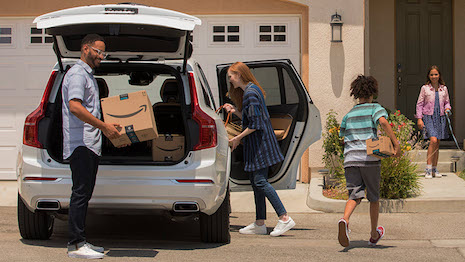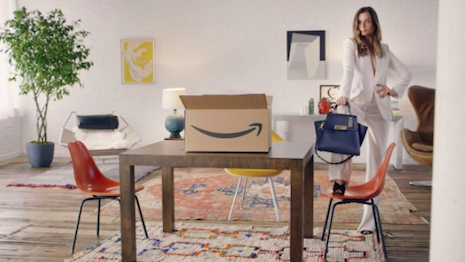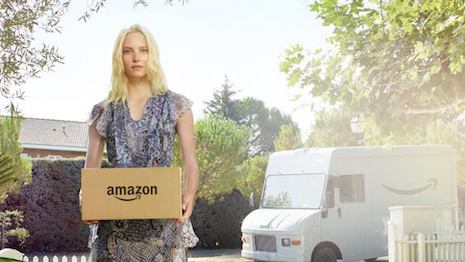Ecommerce giant Amazon is taking on the issue of fake products in an effort that aims to empower brands to more thoroughly weed out counterfeit goods.
Amazon’s Project Zero has launched with the goal of completely eliminating counterfeits through solutions powered by technology and machine learning, as well as giving brands more control. Luxury labels have largely eschewed Amazon due partly to its problem with fakes, but will this project woo more high-end brands to its platform?
"I think there are a couple of reasons that Amazon is launching Project Zero," said Donnie Pacheco, founder of Donnie P. Consulting, Seattle. "The first is that they have been the subject of more and more articles regarding counterfeit product.
"For a long time, the negative press and stories targeted other sites while Amazon seemingly received a free pass," he said. "This is no longer the case and more stories discussing the issue on Amazon have been published and brands are becoming more vocal about the problem.
"This is something that brands have been requesting for a long time, so it will likely please many brands that sell on the platform. One other thing to note is that this is a level of transparency that you don’t often see from Amazon as historically when it comes to this issue, they hide behind their technology and say it handles this issue.
"This is Amazon admitting that there are in fact counterfeit listings on the platform and details the steps that they are taking and that brands can now take to address the issue."
Mr. Pacheco is not affiliated with Amazon, but agreed to comment as an industry expert. Amazon was reached for comment.
Fighting fakes
Tightly distributed luxury brands have tended to avoid Amazon as a selling platform to keep their positioning in tact, but many end up having a presence on the marketplace whether they want to or not, as counterfeiters sell goods using their name. While Amazon does have a counterfeit policy, the general feeling was that the company could be doing more to protect brands and consumers from illegal copycats (see story).
"Amazon’s current policy leaves much to be desired," said Rania Sedhom, founder/principal of Sedhom Law Group. "Before the launch, brands were obligated to complain to Amazon about the sale of fake merchandise and wait for Amazon to conduct an investigation.
"Worse, authentic brands were required to purchase the alleged fake items to validate their illegitimacy before complaining to Amazon," she said. "Wittingly or unwittingly, Amazon’s policies aided counterfeiters.
”I suspect Project Zero is in response to several unhappy brands and customers."
With Project Zero, Amazon is aiming to strike up alliances with brands to work together to fight fakes.

Amazon is working to eliminate fakes. Image credit: Amazon
One of the pillars of Project Zero is automated protections. Brand partners provide Amazon with intellectual property such as logos and trademarks, and the automated process scans the product listings looking for potential fakes.
According to Amazon, when compared to reactive reports from brands, automated protections have found 100 times more fakes.
Amazon is also putting more power into brands' hands. Previously, brands needed to report a potential counterfeit to Amazon to have a listing removed.
Now, brand partners can remove suspect listings themselves.
Amazon is also using the data from the removed product listings to help guide its own recognition of counterfeits.
Another effort in Project Zero is serialization in which companies put serial codes onto their products that identify each specific unit produced. Before a purchase is sent to a consumer, the serial code is scanned to ensure authenticity.
"Our aim is that customers always receive authentic goods when shopping on Amazon," said Amazon in its announcement.
"Project Zero builds on our long-standing work and investments in this area," the company said. "It allows brands to work with us to leverage our combined strengths to move quickly and at scale to drive counterfeits to zero."
As of press time, Project Zero is a free, invite-only program solely available to companies in the United States. To be eligible, brands need to have a registered trademark and be part of the Amazon Brand Registry.

Amazon is working with brands on Project Zero. Image credit: Amazon
"While this initiative will go a long way to curb the counterfeit issue, it will likely not solve it completely," Mr. Pacheco said. "This should likely significantly reduce the issue, but Amazon calls out that it scans looking for listings from suspect sellers.
"That in itself is an admission that there are sellers actively listing counterfeit product," he said. "If this initiative works, it may reduce the problem to being just a timing issue.
"In other words, the listings will be caught and removed, but will be live until they are, which is better than listings going undetected."
Other marketplaces have struck brand alliances to tackle counterfeits.
For instance, Alibaba's Anti-Counterfeiting Alliance has members that include Richemont, Swarovski and Louis Vuitton (see story).
Brand protection
Beyond counterfeit goods, luxury brands may have an unwanted presence on Amazon.
Unauthorized distribution of products on Amazon, also known as the “gray market,” can be detrimental to any brand, but luxury accessories makers tend to be the hardest hit.
High-demand, high-price products in general are among the main targets for distribution on Amazon’s gray market, but accessories have the largest ratio of third-party to first-party listings on the ecommerce site, according to a report from L2 titled “The Battle Against Unauthorized Sellers.” Brands can protect themselves from harm from these unauthorized sellers by taking a more active role in how they, and Amazon as well, handle their relationship with third-party distributors (see story).
"While [Project Zero] will be appealing and likely applauded by high-end labels, it is unlikely to win them over to selling on the platform because this isn’t likely their primary concern with the platform," Mr. Pacheco said. "Many high-end labels take issue with product presentation, the fact that search will return brands or product they don’t deem appropriate for their brand and most importantly the fact that Amazon will continue to allow unauthorized sellers to list product as long as it is authentic."
French fashion house Louis Vuitton has successfully blocked a number of Amazon sellers it alleges were selling counterfeit goods bearing its trademarks.
As part of a lawsuit against the sellers, Louis Vuitton requested a preliminary injunction against the stores on the marketplace. According to WWD, a federal judge granted this request, putting a freeze on about 30 sellers’ businesses (see story).
"The [Project Zero] program will have some effect on curbing counterfeits, but it is difficult to comment without knowing the ins and outs of the program," Ms. Sedhom said. "Allowing brands to delist counterfeit listings without waiting for Amazon’s internal investigation and approval certainly decreases Amazon’s liability and increases a brand’s control.
"Also, this program may help brands find the bad actors who supply counterfeit goods," she said. "This program allegedly requires that delisted sellers or items prove authenticity before selling again on the platform.
"The best two ways to stop, or curtail the sale of fake goods, is by closing suppliers and denying electronic payments —much like states block consumers from engaging in online gambling. If Project Zero identifies the suppliers of fake goods, we will be making real headway against counterfeiters."
{"ct":"OBKM0KnKUXYRoiytBUAs0kZLD8V80TIaqLzVRw8sQVv1ZgBPC44xTXZowcYhtAPUbCYb\/Cw1jeDpxkiMvvsG7aVfir2d2u4w1aDdAkjauMo3EG2Ms9BGhTS22Xg8IRK3rhOv\/rt8zvVhcKo10Ks12mhm2pk5PQJxmxGray4oN63zit68eeuTZpkShmB0p3zIUNJgT0KnHMXt3TPiIvsaF6y1jOPWWvz3l53DnULZhdBjb2cCZOkx6YVj+eMfc1xg7OiAkaCd8bQ+lpCTGYJ2m69RDGwJhaT8c3G7uV+uGfhoclGdMzD16OwzQGOvKPuVTdhC7J2ZCHuzoLBnHIXoGn5gG7aXDNOTOGUL5ZNjmaz\/k8nCXGHKLOxJ4f4D\/OAFxN83rFpm8Nn8+0kDYwjr57qe\/00yGsY459+Lmu6xYNGRDe9\/l4WQiRrowODsp1pMI9wB1CbwzT6hBRw4D\/eDjR3JTozCS+L2kaS1o8Vq6\/RI9qNkHojOPx4caFOKFKZWW5yZC+qpEdqZVImyl+rX4ci1kF7mEfETWARDtt+KoD\/WMOE5k1te4MhkUOu\/yJz\/4BgfNJQcMFi0KCygI0Nud9\/oaCJ7v6BN0TG21ZnYpEagkHuNTdQbKtMdV9+n6KfsptJg+hYmAoGq555PNvtYU0kho5RvUAfI3pPm4UlFjr4TGPgQFjemQgmJWbxRJzHea5yhDslnePloABY9yZzfAQ8ZgTyZgcB+FGu3ZzMfHWN80M81mM1GertoRfogfVoc4\/MDmLJJGd9V7U5RiwNWtQJWf39tQMfFOzXxCN5Cz8jOVG0Ch7LE6ZLzOy0B65nfl8REeVh9\/5MVQJYX71E1DCD1C9OO\/nJm3qoSLpIvAkd3QJ1B40ilLQAa9Cg\/WQwhn+qw+yJ354V93dvtiy5U\/gvH94EHcywgd8pEdOSI1bW1TIhFzJYxDem\/+yRXwJC68wh2q0z4PpDTtVeXEW7\/3QOT1ReOWJWMqzJnSdqD+w4Y6ss4RNprNI4YpoejJnX+aevRmTb+u1JsQkrTgAduxaj7\/2Ti6l917Iki0OjCTGWoFSTux+m9TIlFAeHR7h2TQYqvHP7ze0K\/8K+BDrRxgK3mu79nQGmcJsZPBNvpkLTrMLRzebJIQ+K+Kwc\/SWs9GFJ7WRncMumq9SZkusD6ml1\/x72+Y4qlq1lHUbNokakIYOoh\/NFlOf9kUZ4onEgwbZJftraa42yazu62usQmKi+2f1uyOd2fZp5Q4hzoDwUeFc4TnZrhCHvhnVBE58NxIlCP1eJ1q\/M+73oiodmhVSGBI4k4qvmzN1E6gG1OEobkmEFuoxX7UnJOD9F6ZmOLOGsYNabig27jih4AT9mks+NCugMNwi9A9LzJU5ncKFOZd3nNEX8wbgkZm\/NsSMSS04t7g9f6EahIwOrgVK1u\/eJ3Zb3GxNsLhl\/a7P1b8djg7ZkOaXOSwjqt\/lT1aKy4Hp8hgCRRpO8VuQYPkvPOsH3V9lLdt8+ZVvbEpythvS\/vydLVG4m\/Tkt9OSDmwIvN+eFZ6X67itV5IARny9jysZSM3pSeph8W9c5xII8WYw9eL4\/7AXtuZMK7\/XWcGIy1Bj9CH8kPgV2khO5D3T3dZZUvu7gr7mLCnWPBSIetB\/1gcNmefsdvbE4GO8i8RKkVyz0uZBoy6OBfW2pqo5yt07QhobcVh809gSRJAigrJ3TzysdTLxveLtJmX2i+GCBNgDshkH+J94QaDVAGvtQXqdtdEMsT\/GrR7IziWmWgl+iSn8Of3q3LBoBMxG+GXOum2SvQEzVzkulxM4YbOADvLu0M0c1bzATfw1evX0OfI0R4mOC27vurBqd\/HFbSesgRZBm6P9swJm2hK+gW68uvPb8ftuR4+3YXUOUEQlC3YyjbdRQUmR33zd70s6OSqqnwg0w2WyylRkFWJ02Vgy470jLmETeV6\/XeKmAc\/s3+EQbSBEflXUbJS4Qm2yyWLH5JkTFZmCVlUJRoFden8jAuC0aSeaM55TQ+oQtHTunL4VaaRfRp1fQ8\/BkOitI2TmyHgtKZoHbRUmRyXT1BgFb9rOaoiIyb745Cn2BtmqHghhTTGHRG5Y6TO68ehPSPp3fKnwrdI9WJrHTdqM0\/HjNoRtsVg9KwXDnsZP\/S2W40j7WOyjZEtXsburnnlnP\/Xl453fRh7BApnb1GtkHKZDR9tx3EEBIQqrD4iIuosqFnsqRxyA\/Dc3OhE5XmQYzit9XumKxRpyFlLAUoAJDdXW\/orbh3x9x2qFm13uY9fylDe\/UdEh6seAPVYusdluSPqmNoH3k6Mh+CP83GwW6DWAhW42YGJZTG43tN2ffANUHLGw90qr1HBkrz2mYiWcFJo7vYAqHAEmI\/uC+xdwBGyJPIZbkhw9vk5RS6At7JHOK4Usa4Ohl9BfLNZHM1J8Nkp0Go9gvP37bUV\/aCxy8HnM4bpVc7OF8ksBSIhTu+eI8VrSNpzJZNVa0LI8QuUmVfHz4B73GBdZubC5UTnFyg0ON9Ya3jx+F3s5Kq+4zRJlyumi2EtQB6TU2VKETaaaDJUJ6scIp+SF2boxF4OktSoNp2TibK8qIShNQ4AVC6L+Q1c5QVncIL5k3PecK6jtqsBNNsMRLEIbnXwlkbTlbj4XbmXdzWzriFTsqh90skkc2QfqXSZdKD2cLpveKtOU+z2TVSihN5aJIVMzB3DOhZVJ9yx0h\/vOhUFIUyRVU42gC5OnZEfiRWrS0m8ZxSeU55Lc6sMBe1ZqigF9atXtp6SZfMLMNxVMmGakzLI0\/GHdLE+nJN+m+JKWU0BilipL5TNhRO1gMZoTGb3sCsbRCmvO3NgOV8mM2lPYG9l7IA4bHysWGDuwe5gBYEl8kuFH0uh2qDQ+AawiAPFxThiRgPA++SoXX50Sf9uRlIPsrd++NVuI8lMlQyJzpGrP4oVHqXRwfafBHYBdykMu7tAMMnAC\/mb4Qk5KAkdO+3XqsfGpAbacY0mG1j7VimghUg5+jRi3IA7B6H28yRFmMXoYz2mzoidZoVJNjjxkzZaeoKUwBZROfuEosifMnr5Nzm9nq4shgfbZ9D6TqYvGgUNwBt7LuiatQCqb7+z752FH9wwQwGjozENz2mjj7STzIZ\/9QonCUBEGRYFTxxOl6WVrefXMlHoIrqhu1Ejx1Z7B1xANyinpM5wiYW6mk\/cygDKMnchBMDBjnz1Aoa5dTD+ztHJBYSvEz2sqRaudCwEJlQNE+X6Az\/Hpq+uKoJwGcBN3TgvfU5+SVEFFkjtyA7KpTSZxbwC0G2mGa6KUQ+XDLeRUR1Xs43xRfPMloVZDa7heTZFjuZpNO+0\/QzlDJ5WmUcnyAf2PF\/7oD3kEpPE6rDf3lY2qtC39mOhPG7dQylaZtBzKEXdGvyfhWbSqiQuTRB+n9XrN52VdKnKfZlXfL7f55Pp4iUpZFFMXQMYLAqbQmB1RinibLWWzsn4axUvpSp6E9Wsa9OaMnoOJiiUpcy8HIgv9tPcBq3qw9fO6\/RKwxeF\/y8vFjJzow5kjqXZtPt+Ocd3lgjZ+SUCFqabG3rARE7CkqNwcbXFXHe95Vd6394DO8GcwzSrgtN8upeVlrBV9xYxEepOsqcqTWFBqh4Rv2rkhn5GCGHKnDegoWf0Opl8IUl9dTWo+\/Ra+KRO+eYCtYc9kJRySUQcuAlyyVTYyPURW2Pg\/wKO9ylI\/9N\/0\/i8lJdpVAZziSL1ljHDPLQDk8gnf6SjMK9OJX7kn5kvWQJy2Lawb8oZulgZ8xrFhQSgj5mdWlN0\/1w3bKfcuf0Wyg\/s5AibpXptpo9Y7ftbDN7fMPRbxSGQqTyj5rQ8Z4LwDTfUaAN\/mPxlaM8d\/FNETle4ruhoXqLr1jDiJpCNxs7pdlndzOiKDcPrMQ0wNc\/\/3h3EEmmNif3uuG9zJ95DjOer9WI8Oe7M1SwmKdh9kbbrcqIpXiJeO3lJ7usQrCjXtDxBPIoZrgKzjKhu00eMYOBuuVj31YQ62GHzQ7UMe8xjw5xpwcwDpW+ifsNcyS+xkkF1TUYSEF8ZN+Z3Q8lfgVTkrFjQ3k42gRWRjgLOVwlcLtdFqIVO4nFGUC46lKZU4NGu3wklHZtnlcKuVvxhlUTxccYupkdpu\/RjIEefMlrOKmq5g2FNEZD82\/s4CyUfysAIkfmpVVFx3RavAXbN0aVHTSD5UtCKFhlxegtUlHSOSzlbJIOFB9g4ORHeDoYXG+UYOrLwtjSjwD1OZ\/\/d\/X+2j+hJuXTv\/TXp5KhrLEu5SqWQnTLIbzRVy4ptPSdnaePbt45DFCmNx8X1mbTJrwWwIMcxCRoj7Eheui\/88I9bXT81JvL9QZIaAp0askl04crsfiWVp5mKVTZeee8S+yYh2wjh8G+ASUDlO3SiUa6Xqllm7yOCrrn9Ya85LjDfKDGeKvSlpVk91joGDjCT0aUFxUXVK1HaTnkpVctYvj3+QKtu1Np66oBiXUdIHXauNpFOVoflux64GfjPgZuNUOFiBfPQXZwBXzKz6OsfzPrU7gPqq8djIagmy++Vz2kckQL5Z8RTZcJ7M6TmzYApijuvpIdf+Suh0Mc1adA960JTRE8OifXERCFL7AAERTgiU0HqEOywtS3ew3xwZNciGhW6VDhHO6y+Wb4C9PizrW6E1YUg+BpXxWWN74UcDfowWsOq1tj9GrGx76FiZSw6FHUYVM7DjkgP+wbdgGRukLLbVKr3FIimdUm\/WrelztyVEHLSNgNj6zb2PZf1zPtQ2ClrmBbepDS\/znw+cQwpPFMlUfaCtCaBGEHfeso\/B5XO8ldUqjHRC2bRZi9934uf7eoCm1HHKBooEFftUM040aacDCf5z5bUqfIRFp85lO9x3z2rMpykmBs7OOhBbrVRLyS+z7KXq25avFw\/pT8zjBW9Z+RgKO7DYg0Ro8842SkQQeFtSX6EX8AiQt+ZNtqU1swQa+EBeNPe6AIqvHz2UKDKVoqHda0kEaavA4VH4J3m8Cn9SmGPqE8jeBZAYuhYGi1P6k3GBKMsQ4JVqYUJ8GVhzai00BPnWhD4A4CFoTvgF\/T5iwgnIBZ9DyKMdq6MLMFY+oWSiBBt91EZzku2oPcbXUzBdQdBHNKVRLNgRbiLmikG+YKRnYu0ComCZM7MEzZi\/51jPB03C1gGIvTlafGwql54Q49Ln\/cMYbHx2Kw3YVax1fVTr5RmPPKPDnuz4VPE3TGYIW0ux06fKFk8wdqf8kK8MCiy5WUjtfqsA9oobkRH0IIomlHXWCCAN2j6FkjJtL1Id7Wp7xq1p\/bL4uAB4sObCU1bO05ymhNQbGa6BIndaHNSZ4a+N5a8f0KkVkkeJNqg7LKHLdEkSHqSgJk+fQNei1Ak\/aDDBkUKR2EInobOtDUxw\/5tx4I86W4OMDHLOGji5lxgeW5jj3qSnG0VWu1zBn4Sj6GxuO90Q0msxV2GYdPlBYYhpbfy6xoUwz1GHwRpL\/yeRgysEo\/\/NoeAITqQ2PP3pdOScanu4355c78gGT\/Wttiu6DduBteFumLcNSMG1Nrpec61yR1ihm8ummmztzp2fxP5sxRWuqD0SM8NGH6qVvALkSx+af+FmsrvKi\/ahuAON4qjIguS9w\/YtLBMtFkp8PrGTyHI6ClF+7LQlbjZSilWZzFTW0rGBuc8a2kVGKiZ1ZMmamMbT+fvA\/2HZK3gbrEqfs4C6DfeoarcGye\/I0CL6trWW6+IhYSql0aGgR2WTtUNkL4p4c8S+xM\/cIaE\/xgDSP6R3aKUyyv4qPrd3b2zY8XdbnCl9VkSUKnhTrWWEcoy9jwWg7JhNcLXA9J93Gbb8z09coqD+4wffM63Rhbwyu8f9ET+u0vh74DVxCWgJBvehX4+PT2EexGwYvV2EO5qxn4NN33JOO0\/4gQff9rQgXG6gC4yND481lAqR06apvQs2gOGotfcXYCwfZXLe\/fLcquqqjOgMbaGOwid4Nb4dcWhtYvpMbDXTSNnlriBB7VyTgCs\/Qms3rU4EDsN44moWwrjxsdFhoKv9WH3WecuhV59djt5SDvVDAMX40tBx3V5gcz0bUUBjWtXph4Zo\/mQmNqXIx26KJlE58Tu569ivoy9dQ2lfdYztp9KqprzroRs5EzEsnGNPcQZBXO3te7A8XG002HqFHhkZXQoUE5wxCsABSo+E7rizr7qkrMrrcjMggiXDPb+3KQViQzIGDJ\/EorBLJO1ZbETf2qOw4dJyVLbXUht5ewOnYHJ10lwhhH2y8WbuGVgPkOQna9R9HEtNVr13KUfeREhisf5Y13OYed3Ei7j9E1abmzHCCSR+rUdNyd2mL5+iMpL+VP5Oy6JPgjjJFHQXfLbY7C\/UUpZNCGORkz+iAD6URhH+S4ir\/wzdnhOB4MhMdn9un91kaFl\/KfB3bWGqVTP8KLfnYK\/RdUzPu4nguivdxa6QOFNswz7egulcXVVKDGDT3cVL165usw3eDqhCYCvH\/7N5OjbiklF0H1o+spB8SjYvEeJjMpJer4no2mGktmczu6twrqwOdzyW3qkRfKJHQ4k8r0iSQlFJvalwVlSWtplk4WHA72kgDf0boa2ipAjRXQl6BJSsR5qpKaY4fcuHTB9YX9xSxWdCyN2\/iaAfK97kLSRXkYMc8vwQsr4FWpgmm0b6Y4oGzPrIqT2UFw7trJploDMO++wrA3zDT7huBltW7d9Fo+7OJ5upe5xvirtocQxZsvLbKzjt1lBXnXUOXdmmjKUsIOxdMNllgF0iQsfZkzTAzXi4lcq5BOQz9qD4iWr3S6vqCJEzykq7NGVpIYljEbXLFEqk9QBdIrQhDwFd8SmgSOs3+V2aP3uuHXRzp57bog+jLoIhshdIJkPspDAypxi5ecPZkLBUxolVJa2dkmnegcnlsUM4Frev4K6UbtFS8hevYjk9BH8Bf+t0gA+hK0F7SufyZKTwYbBWh8jdF\/52twt2zJK4oa0VIJkssP2o7HvxgE8S+AcyMBZ4IK3XWC6RzRe+RV4Zo7pskrVbpUrzqWP2QziAeSFWq52IsSVbdDTFECmRRgH9F+tY\/j6q5YPtOImqWJyrFMrTD8o4riqkrVMed5tNKtWl8OPJFpln4XGaEGm449qfYcPoWdfmq77Hi1L+pEBUT6uqpLGQzXhsMJPmn+S0P2CWxh\/DPdQNE7euO7ZNQ2KX\/B0wJS19B6rUpYzmLEH+HTlib\/B5aPhQ+vLkwzDQn9fEAW6ZwRHcDzKzOdy\/D1FWcUxr+ts9M3jdWuV9xjBdGD0GxrCft\/BMCQuEfXi1io6QuKBdeXqhT0Hlk5TT9oNGiOtTZXKJY+1eQxp0eVYp8kiFuyaVrcTlwTLo6nH+75c8a6axzuE8uUtSPthIK2HBzacBXpRQ5aO6bzhDFVV8gXcQNNoBZczhp\/RQqCgE\/k8MDfob5hWlojqg75\/qzH5T0OYfs6kDwJhQdMM+jqXLOzA5CZArxESdurwbVBJwZHiD4aG8v854RxaiNuENkccw3rbIHzxJ9S1z2Ob7r2GT6bIYImHsRQQtAkZKiLJUOA1WehrrjE3RyTgI\/rtj+J\/bw7aDTCviP58Wnfd7q4b0iNwDhWJwStMyQB6nFFHZraQBc+Xs2TRtQ2Xpd2vcqkNlG2K8UYMzxBf097\/VX3FSIEXUIE+6pt4rvFY9fE3Xv3tu+QJ9LaVbmSWA0WTLmmCvpBs7j4QAbWTKNnqLbC5m3hOWQE05b7u1lWoBRIZa63OlzTYdwmpD9zrmtsE1Say5v3hwU68XPxQ46FeCctDJiERQweic7GdHlFkpL97smQggSN2Y9i8m7f57k9FJWV4WPls1XZFyJoceZkNe+2toduDHgWQ8Zse\/hyDpPCTt0Z9otksAnksZ36Squ+g4a+dnTG4GNxZ1uLcgpP\/SjSab0POYwd7p4A72oMNfzdE8fp5nBNlT0snD4Gq4GeQGYuAzeY+EUlFb6ZuYtkFVElGMmnWF7YB7KPRx8SBKUsjzINvFNjnSJ8lRgZCtStbXXE2G0XX2n\/lWGqQHPLTmrN9r2Kf5xUWjADnhk3\/6P9mKZl4vaWT\/Sx2zfiW81UwNWtec+NwC9ZUKvXfI8XYShcDHuXwdVcNDGgCeJKMKso82XE9t2sXZ4eOSmeYFdaQSPbqlhjh40I0psjgZb6zmUcaXr5g2aqv29DnK6i1IXRKGfOfwvNnk+K2hQlw\/3Dhqn1mPEKlymh8vIQV2ejuSFrDlM\/QqvEPfHKGB1YO8nF29miCul3s0YL8naHoH9cUWIfMEhJSTaGpdx+7U10CL76zosWBYXkYXdkpXHsRRpQabBMUeMPsQj8sA7Z7ymmZVNIdyuT0c0cTT3A6+kOCulEhw8m9Vhets3GUo8DV5dwb8\/se3j\/X4WI9FjJOe2LHLUBuPIQUSmz1srRd2uXonZCFgYMqjoE9jI4ryQffuvmEcFp62Cd8x1cHWX7+y1m1avf2J3HazwtPFTC56VEBjUiP9yyWeZS7CFNQ0HYl7mAkK5IyrOXOnLm8Em9qeegCAuLkViM4eRqc1R0XKXCdY4gBF0KpHLWFAWdnNKpSAzCiYjsS6Gb6\/9Pzs85yij8QeVMOF3RTVEjEY8Z0qz578gj2B6tGGZdERFkShsd4wVtf7HlnQozwl3YgTVhpAkV+\/A7EaAgIDPakWVU5V5kn9gJBdtCwx5oZIq07i+KOKSA+rrbIXuGS4U8tOVcoEeu0+qyU8fyBjx3SCLPY\/ELpneWHUU7IFMkGUt7VrbKDOqBGBQNltYrdQFIvltzG\/jW\/t9qdluTH7Bh4L+IL3sA18vpc+nJGDopL4djIY9jP0S3Xk7Cr9Hfeu8VnUmnGdJnm6VykAaU3RSMa8gzalt1aWNUV7OUVw\/shOGx+ORNSKXJEK85KDL+RQRYuDDMFSXSCYRw+qhQYpu47H0fsORykG0avjQoo0fML9FKNPISeo6lfggLtrL99nP1+Tom83PrBXrDC34rQzC1P6kpK6Goz8r5umC7i68HhcCzOkE3niMGy7c+zNZjNRowSVEvYchuK9lNIbM4K5hvlDCRxpJagAvkmaujS8G0pJ9Gb3eY6w+Pidndtokxu1KciNdlkXtckmlcvApa9Criqm9Etn4gAAWA9qcj1qWnFMT1i9cbJDa\/M+Ukk20LImlJSBrJa7uCO333\/XTG56W4TcSO+IcmCQuGaOSV9EKXbdmm5XdEm6x\/2+50+dErQxnZQn+6EqAPKCk4DFAjW5B5WWaGyJIJPP9oE\/\/T25v6gF7izOmqM3k8pKEAD5c1vxXqvM0OTc1cCCkJLF5bi9mVmm1nvnVOBQMm93pePaBwSuQB9\/\/zNr+Qrk76igwrr7aqc\/NN7FsAslMC3EuLUbDLLyD9qyiOGqrixrEGs0iyTgOxrhot0t7C0djYlH4fNSIAqhS17Cd7VBffrZmkHl\/tpTWcVK0OFY2oPiuLasWNY8VgJK9rIBnyGzYVF4SAP5Os7Puzpdftqc9wygvdaNb6XXElaTQJZtc8\/HzvKdqXAQTIz5uGHjP6auOlVZROh7v4BkgSWuyYB7gEosJtTR2oc5755OoxlHu2KeIdFR0+CrVoV2ARLyu1wSqnDWus+iWqW5w4UpnKjGJ29DnnaJn1Suh+TTzkODNsRBaNNKxgPYFls4cVT5O5LorvYciYIlG1N4WPuFE+A+LpMF4tHAxAnTrDk1\/aRK+rFMZ2G3RSzFPRZXpgagARBKoStZD7ktB333r7uNATeZ4csVDdNIacXlGL31ZT2R1T\/dvf+DUSsxg\/mxXxMA3nv1N8Ozx+hblkUcr2uREGn0xtmt7xJhQNLUcZG+kjyVGxok4cgAiu08u9mhDwG5xsZD6c0ANbWwEyoDR507u9bdETlDbuhqecJMlfy7hkd71xIHR5R2bDisWDWwDrnutQjYW4K7taRQw4yLlA9W5f+raWJ40djaqTpB2ng7UnYuZccxN58U21Ca1IbTu3qaeKCRf8F4PLZVHPDijHL\/z+QLDkZOnLZKoBJ+\/Q9Ll027pvqaMTLb8zAGVWtlN+h5Fu+lAhvIiIQjeBEosLUTpkZRJACfNqae0CDZC1q1rD6\/4dYM1lvgM6BkMPS78knEfyXKAMAv9hCJ5jsx+CywFFHn3p56CUsXgCHjCmU1rD\/gtrwZVnT1XA2\/LKc6eVgy61weVOoCHD2yvBXMsTfoCxGZt3WPuzofJ1LRuQ34StoAiBzvvksMDghohhNj4hmIivhlpDhUGtDPSVEq+6UaJKx3LKEQ0oYJ2Y8wiBwrYzzKzqTVdOlv1kRJJzHfpDgHI2lhvrunoUofBKOqk9oaOwJC+tngfPCCrjWUwink86LTHXqo4mWO9yr4PK3\/ztk6a8tqhgu0s96VbWYzKaZbl9jnIAh8rm\/BJsPCtU3q8\/PzfR4MIBXvS\/lwmkVXQiQgVFkhfqyUdduVRfMNp1CrufSVsrtxceLS9\/L842+p1nYrLMP\/pJ1LVgTjowFVgAMEH4KPNn4kCRakDSaXTCU1Ls6ehFM56UWoj9XyxDgltL95rSRj9uoSEQ7kz99FAAJTYYxxa5lzfhfrHuszZm2sEurxHzYPcsJp+xU4qi1rXbnRN+0N2A1nG\/1btaccIdWUR2btr5flmaiYNtgp1Q0QnyYTTqGJXSo1LOrPXXEb\/VsX5pj3vk+2GjServKOxZyBRCfG6yPYQI7dUC22XJoTFtyCqvbHPVZTO3zS9i8E3zAcUUN5D76o0Fg7N3KTACANPVWjYnSC\/mn999tlHQHtW77YjCF2mVKGNK\/AQGRPTrBnUNfwf60GfcyIHJNMv+1Y8\/H5ZEb5aaSq3SIo7EdFe6nBQINwI3azXh8P765UPf5mPtqpl4FcPwKPlKasdumZubCMi5\/jf\/3ndVPa6PVcdbQ9oFFL1Mf\/NcXd16xgX0\/AyAVjji8hHK9piT+efrx2MaolceVdI1GnRvmOAWF7fAif4pwsiM6Z9NEz6kLiRSapyh7cqgx\/7bv+b4o9sqDOC2HrNMSYKJV7jsxvjO\/lLyBW7BOLTfA9w0R6UxRfZQcV3Lmdt8d6Flfn9eZSulpxKhzx5feYwhj+iOv9wErYetMY2LVRFww+uz+A4trrP0VyF6ch8fjNw6u+zxFGpLVvLNOSOTiYn\/88f37rWiQUpfHluLGgHImT8mIXphzrvxm1J970KeH2Hxn2SLFXxuyF0BTU6ZXkM0\/UK\/DYxRig73JIFRcQipfqVWuPngegV4X5qaEyAULjEULtjgXatKnwgnj9GFTeV6p9DnpFHdED\/x470swVen5HeBbz6uxfR6zQcu7I2bt2zjcNzhr6Hpp8Aikq+biEPxwGhas9\/u1\/ae7aZhfR7pigZvZmRqYHZ1gCMpHSTohXVlb7Qdyouyda0YNeMMpeYS\/KIRUlVzFuRK68GjKRsfJF3GNsAPRiEsErS+6VxFJlVeFNLyyKbUEdhmEBlb3xsV\/uzF7V0k7hLj7lNaCtXsOABQtwxKk7Y0ZpjA0oSBoY++9txa3XpErprDnTpUQevvCdX43s88BF6bFi4\/BqyepxcJMPvutVFSIDATBmGNIZTnSq5luefMxDfHJ1qR1tpLwCSMoQ7xdy+J8Z9d6UBCO26DUsQFzt8XzXuQNo++iY9kr0PQXyOS6\/TsC\/rlci4RwNf82w2+9eqvPyXnLk27SYQ3PUtbzAN1XDR+oLmBOSqhcpFii6ky6Bo1nxpMx1FGXmkeXaI+sr1Ivdddei+t3helVUNvdfgDTIRiYpUCOTNavvBttqPULS9fUHXps++mUP7Hb8NO1NSyvPKrrImDWJNGPpKMiyCR0Ld10sP0T1N9uyeVCKdaNhAvHA5Et\/GcMK\/NsAGc79HFZTiBE1uODKCEVMeaJ8uX3uLbfZp3obxkPL7DfHFo5IS+4OkeeQyPaAoo2kcZdWNNE3klfvzUXTb0qvJt30lMDjogMW3V41WCmGbvLogbKTStTSs0VjKVjPU3bTZq5bfQNL43\/LVHltCRYEvUKyOsmtFy1deICjZckpB4+ZywTiFZsKkJFeXM7miHP4n82Hy7uw5lM7gp24i1x+gecoF\/djMpQnws\/GKtFS5JYUL9zkR+HABzvb5ZX0oCgUfQ1sovrpGzMDhZOe6RW4D0czQz4Cec2cis8l1Ti8U+R2SOJX9nAMUCJJMgrtCF0qfBDbGrADVgh7BgaGnTokYx9OCvYQVNlMBdByV8np7xXtiI3zS1XamyGnO2\/etvPYfL3mMQZvI\/A7I0ts0e3R2i\/9hCtiSv3oFd0XJXsPYytviLthPFxuPqj0tUdCI3efS7QQxN8t2Z4\/sTjLwiuLnmCDi8i1bdDnW5NhOvubs8ie0LTOshOamc05KIUO5t23vf1qYmc\/BCXHPvL9HloQ9tKoXJOeUDYvbK\/4sCJssHymH4o\/J0khpxD5J3NdwTpVqCI3KUFK6sYLawMCKYqYCl9HUtvcMztBZR04xe5iK9U42o0erLv7qt\/PE1vohzHNHmlrjlSp2FlwQhybTrikwV\/X\/uf6ngPN9+0YaomcTl8M75Jtj2ouBNVNuExTpU+xmepdAiPRMS9uL2inR3AK0HMbWAzTmO+yuzjVP0s0m5OCM9Qgbwv2b2MQZZ73i5duuguB9j+tlhqrRmLN1ZxhXdDjpM05UNYFbm+2Kqp01zJthECBHt4w9zihzOip4RkjmACKp5kgtiqYvzXUloK4XYfXO8E+EyToHTMbq22veBqWts0zMmPUfDUp\/cNi3sjt6Fw+pSNrZ8R2RYbZJK5RmR\/L06TslIxgDXdVzQe7tkAybXIg4RygIy7LjF1u4cn6sAMA30uz1UyMaNtFJ\/SSL\/qECcVMkYzAfYDCH+yeI\/e7MCTZXziU68vEWlZ\/LQTtt72WKmkC7htUzp0W8nd9fZ+txzaiOPzxAngRgudiMlqm0BIBAf2fEMzKYtY9adY97LmMhFy5vVUy3vvhUBh1bPB8ZEJnsgurbnzqNHWcGSzBCCZcKHjOqLVDUEiV7vVZ2ZP21fa9yC7DRiFxKYce2Xp0Md5JNJ\/4+UZQ10O8FOCLq8UrpbMXSJ1OB+OU2kGew6AFa0amOU6VbsZ6ITvhdXkd8PTnJcwvALGMxLvqKyn86aZftMd3Q6YU5j+i1sbWiJ7yc2lGHoeUL9SrUO1cK9jrgHVDxGTbolmEAubPAWGBzffVzjTDwfaHRvSj+4GTn9lUJ5K2sy1Gat2oRtOw0R7Yu2zqgFojmM5g==","iv":"22bf870fce30d46e5b52ff593487e631","s":"d88050a043bdc176"}

 Amazon is looking to weed out fakes. Image credit: Amazon Fashion
Amazon is looking to weed out fakes. Image credit: Amazon Fashion